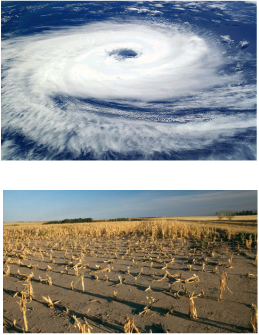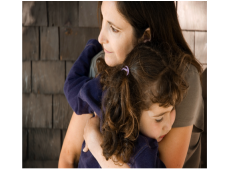Climate Change and How It Relates To You
The world's atmosphere is warming faster than scientists had anticipated. We can expect increasingly frequent and prolonged heat waves leading to drought, crop failure, and wild fires. Higher seas are causing storm surges, and more violent storms with heavier rainfall are generating floods and mudslides that can disrupt energy and food supplies.
2016 was the warmest year on record. It beat 2015, which beat 2014. In the midwest, drought-ruined corn and soy crops sent farmers searching for varieties that can survive in more arid conditions. Texas ranchers turned to Africa for new breed stock that needs less water and can better withstand heat. Water supplies are particularly vulnerable to climate disruption on the West Coast of North America, including cities and farms in California that get their water from Sierra snowmelt. The San Francisco Chronicle reports that the shrinkage of Arctic ice caps may trigger extreme weather this winter in North America and Europe. Insurance companies have taken note of climate change and will likely be raising rates for farmers--since harvests are no longer reliable--and for other customers due to increased property damage from more frequent and violent storms. Resilience is the ability to maintain flexibility and strength as local and global conditions change.
|

Get Started!
Check out our schedule of free workshops or Contact us for more information. When you participate in the free Resilient Neighborhoods workshop series, you and your Climate Action Team meet 5 times. You calculate your carbon footprints, then choose from a menu of over 100 actions to reduce household CO2 emissions by at least 5,000 pounds per household. You'll learn about rebates available now for energy efficient home improvements. Even if you've already "done a lot," you'll discover many new earth-friendly strategies. Once complete, data from teams will be provided to local governments to show that residents are doing their part to help with climate change. |
- About Us
- Our Program
- Ways to Give
-
Climate Action Toolkit
- TIPS: Navigating the Toolkit
- RN Handbook Sections
- Meeting 1 - Overview and Carbon Footprint Survey Links
- Meeting 2- Shopping, Food, Waste, Water
- Meeting 3- Transportation & Home Energy
- Meeting 4- Emergency Preparedness & Building a Climate Movement
- Meeting 5- Climate Anxiety & Staying Connected with RN
- Join Us
- Donate
- About Us
- Our Program
- Ways to Give
-
Climate Action Toolkit
- TIPS: Navigating the Toolkit
- RN Handbook Sections
- Meeting 1 - Overview and Carbon Footprint Survey Links
- Meeting 2- Shopping, Food, Waste, Water
- Meeting 3- Transportation & Home Energy
- Meeting 4- Emergency Preparedness & Building a Climate Movement
- Meeting 5- Climate Anxiety & Staying Connected with RN
- Join Us
- Donate

